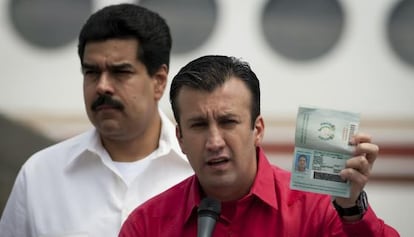Rising star from Chávez era among suspects in US drug probe
DEA investigators believe Aragua state governor was paid off by a narco kingpin

When The Wall Street Journal (WSJ) reported on Monday that top Venezuela government and military officials were under a US investigation for drug trafficking, one of suspects named in the probe was revealed to be a prominent state governor, who forged his power base during the time that late President Hugo Chávez governed the country.
In addition to describing Venezuela’s powerful National Assembly speaker Diosdado Cabello as the “main target” in the US government’s probe, the WSJ also mentioned Tarek El Aissami, who is probably the second-most-important figure to emerge from the Drug Enforcement Administration’s (DEA) list of officials under inquiry.
Investigators believe El Aissami, a former interior chief, was paid off by a convicted drug trafficker
El Aissami, a former interior minister and current governor of Aragua state, was reportedly paid off by a convicted trafficker so he could allow his drug shipments to be transported through Venezuela, claimed the newspaper, quoting what an informant had told US investigators.
During his university days, El Aissami was attracted by Chávez’s revolutionary discourse. He was a member of a leftist student organization at Los Andes University, a hotbed of political activity and confrontation between rival groups located in the Andean state of Mérida.
Chávez needed a group of young, fresh faces – later groomed as future leaders – to fill out his Cabinet, and invited El Aissami to join the government in 2007.
He served in various posts, including deputy minister for citizen security and later interior and justice minister.
From 2012, he rose within the ranks of the United Socialist Party of Venezuela (PSUV) and became the formation’s vice president for the center-western region of the country.
From 2012, El Aissami rose within the ranks of the United Socialist Party of Venezuela
As minister, El Aissami had announced that he would extradite Colombian drug traffickers operating in Venezuela.
But his reputation was soon tarnished when a Venezuelan drug kingpin, Walid Makled, who was captured in Colombia and sent back to Caracas months later to face charges, publicly stated that he paid El Aissami to allow his cocaine shipments to pass through Venezuela.
Before he was extradited, DEA agents met with Makled in the Colombian prison where he was being held.
El Aissami has always denied Makled’s allegations, and the Venezuelan government has said that the accusations lacked credibility because they came from a criminal.
The trafficker is now serving a 14-year sentence in a Venezuelan prison.
Despite the allegations, El Aissami launched his political career by running in the Aragua gubernatorial race in 2012. He took over from a disgraced governor, Rafael Isea, who was accused and charged by the Chávez administration for financial irregularities while in office.
El Aissami’s team of advisors also helped fuel the accusations by pointing to the remodeling of the Opera House in the state capital Maracay, which was never completed.
Fearing for his life, Isea fled Venezuela in 2013 and is reportedly cooperating with US investigators, according to the WSJ. He has testified against El Aissami, who recently discredited him on Venezuelan television.
“Today, Rafael Isea, that bandit and traitor, is a refugee in Washington where he has entered a program for protected witnesses in exchange for worthless information against Venezuela,” El Aissami said in the interview.
Tu suscripción se está usando en otro dispositivo
¿Quieres añadir otro usuario a tu suscripción?
Si continúas leyendo en este dispositivo, no se podrá leer en el otro.
FlechaTu suscripción se está usando en otro dispositivo y solo puedes acceder a EL PAÍS desde un dispositivo a la vez.
Si quieres compartir tu cuenta, cambia tu suscripción a la modalidad Premium, así podrás añadir otro usuario. Cada uno accederá con su propia cuenta de email, lo que os permitirá personalizar vuestra experiencia en EL PAÍS.
¿Tienes una suscripción de empresa? Accede aquí para contratar más cuentas.
En el caso de no saber quién está usando tu cuenta, te recomendamos cambiar tu contraseña aquí.
Si decides continuar compartiendo tu cuenta, este mensaje se mostrará en tu dispositivo y en el de la otra persona que está usando tu cuenta de forma indefinida, afectando a tu experiencia de lectura. Puedes consultar aquí los términos y condiciones de la suscripción digital.








































